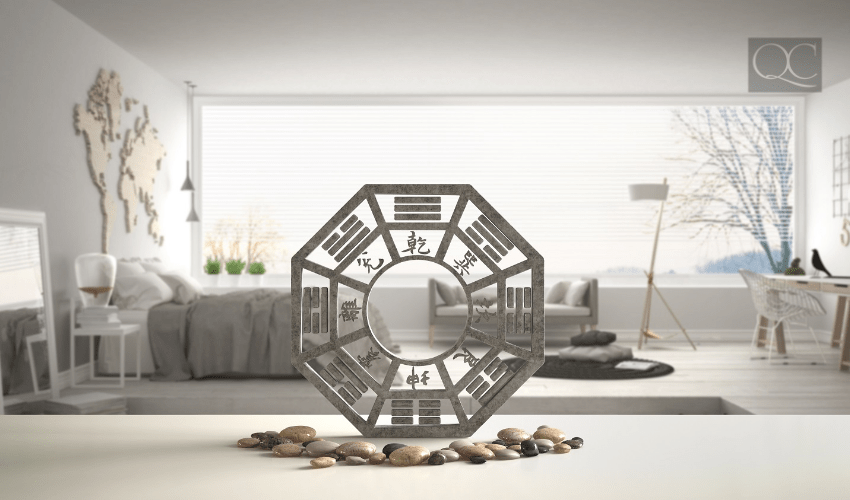The founder of Eastern Design and Home Staging, Ivy Ellerby is an Accredited Staging Professional and Advanced Feng Shui Design Professional. She is one of QC Design School’s leading tutors, specializing in Feng Shui, Home Staging, and Interior Decorating. As a renowned industry expert, Ivy uses her knowledge to help consumers increase profits on home sales and implement new design ideas into their living spaces.
Learning Feng Shui is lots of fun! Admittedly, though, it’s also a lot of new information that can sometimes feel overwhelming – especially if you’re brand-new to this area of design.
As the leading tutor of QC Design School’s Feng Shui Design Course, I always encourage my students to ask questions when they do not understand the concepts. But let’s be honest: sometimes, you might not even know WHICH questions you should be asking.
This is totally normal and completely okay. That’s why I’m here today with a few tips that I guarantee will help you before, during, and after your certification is complete!

10 Tips for Maximizing Your Feng Shui Training
1. Know Your “Why”.
Every designer has a reason why this chose a career in this industry. For instance, many of us had a completely different job before. Ultimately, our burning desire to live creatively and assist others in developing beautiful and blissful spaces drove us to pursue a new career path more aligned with our passions.
When you run across that difficult client or challenging project, it’s important to always come back to your “why”. Remembering what fuels you as a Feng Shui designer, and why you love design as a whole, will keep your job from ever feeling stale or heartless.
2. You Will NEVER Know It All.
Feng Shui is both an art and a science. It’s based on thousands of years of observations that have been passed down from generation to generation. For instance, the information contained on the Luo Pan Chinese compass alone is more information than you’ll ever learn completely – much less all the ins and outs of each school associated with Feng Shui.
My point is, you must love learning because this industry will never allow you to stop. You must be instinctively searching, curious, and open at all times. In the beginning, go into your journey with a commitment to being a lifelong student. Even once you are considered an expert, there will still be even more for you to discover.
The moment you think you know it all will be the moment your success as a designer comes to an end.

3. Learn the Feng Shui Bagua Map.
There are plenty of valuable lessons to take from QC’s Feng Shui Design Course. But perhaps the most important thing for you to master in this program is the Bagua map explored in Unit B. Time and time again, my students have heard me say, “If you cannot apply the Bagua properly, you won’t have any clients because you will be incapable of helping them!”
Here’s a good example to illustrate my point… Say your car was experiencing engine trouble, so you went to a mechanic. However, the mechanic only asks you about your dog and never assesses your car at all. How can your car troubles possibly get remedied this way?
The same idea applies to Feng Shui designers. So much of Feng Shui design is rooted in the Bagua map. If you fail to understand it, you’ll never be able to provide beneficial Feng Shui services to clients.
4. Take Your Time.
With any self-paced, online program, it’s easy to want to finish the course as quickly as possible. After all, the sooner you graduate, the sooner you can get started in the industry…right?
Sure, maybe for some. But for others, this might simply mean rushing for the sake of rushing. You’ll never actually learn what you need to know by approaching your training this way.
Once you enter the working world, you’re going to be the expert. Your clients will expect you to know what you’re doing; to have an answer or a solution for their problem. If you prove to be unreliable, your reputation will be damaged pretty quickly. This can be hard to come back from.
It’s imperative that you know what to look for in your clients’ homes and be able to provide beneficial solutions for the things that aren’t working. After the initial consultation, make a list of things to check once you’re able to physically see the home.
Take the time to properly look over the space(s) and consider recommendations to enhance each gua in a traditional and modern perspective. Preplanning is key to success.

5. Learn to Be Flexible!
In the Feng Shui Course, we teach you ways to enhance areas of life, such as abundance and career. But not every person equates abundance the same as the next. This is where the initial interview with your client becomes important.
Ask you client what images and items help them to feel abundant. To some, ‘abundance’ can relate to material things. To others, it might mean good health and/or stable relationships. In this case, what does this particular client think of when they have good health and relationships? Is there an object that represents this feeling?
Think outside of the box when applying design elements to balance Ch’i!
6. Communicate with Your Feng Shui Tutor!
The most valuable resource a new student of Feng Shui can have is a mentor. Mentors are great for recommending stores where you purchase items, such as faceted crystals and other holistic items. Your mentor can also provide helpful resources or insight about space clearings, running your business in the midst of a pandemic, etc.
Just because QC Design School’s courses are online doesn’t mean you have to go through your training alone. In fact, one of the biggest perks of being a QC student is that when you enroll in your Feng Shui Course, your mentor will be assigned right to you – in the form of your tutor!
Never be afraid to submit as many questions as you need to. In my experience, a lot of students don’t ask as many questions as they likely have. Sometimes, it might be because they’re worried about bothering me. I can assure you, this is NEVER the case. I’m here because my job is to help you succeed! This means answering any and all questions you have about your course.
When I first started out as a designer, I had a billion questions! I didn’t know where to find customers and I didn’t have a lot of money to invest in my business. So, trust me, I get what many of my students are going through.
Just know that there is a plan and there is a strategy. Every question has an answer and every problem has a solution. You just need to reach out and ask!

7. Don’t Be Afraid to Practice for Free!
We all have insecurities when we first start a brand-new career. I thought I understood everything until I walked into my first client’s home. Then my brain went blank!
But with time and experience, I got better and better. Eventually, I had all the answers before my clients even knew they had a question. In the beginning, it’s going to feel intimidating sometimes. Just remember that it will not always be that way.
A perfect way to gain some hands-on, real-world experience is to practice your skills with people close to you. Co-workers, friends, and family are all excellent suggestions. Typically, the people you know will fall into 2 categories:
- Skeptics, or
- Supporters
The skeptics are those who don’t necessarily believe in the power of Feng Shui. Chances are, they’ll force you to know your stuff. They’ll ask you all of the challenging questions that not even you have thought about. You might have to say to them, “I don’t know…but I will find out!” At that time, you’d go contact your mentor or another Feng Shui Consultant to get the answer.
The supporters, on the other hand, will probably be more openminded. They want to believe in what you’re showing them – you just need to actually show them first. Again, you’ll likely be posed with the same difficult questions. And again, you might need to seek the answer.
But no matter the perspective of your practice cases, you still have the opportunity to learn and become stronger. This is the key to becoming a wonderful Feng Shui designer. If you are never challenged, you’ll never grow!

8. Get to Know Your Clients!
Feng Shui is a very personalized design style. Every single detail is placed for the sole purpose of supporting the goals of your clients. When a client seeks a Feng Shui designer, they expect to share their unfulfilled desires. Their hope is to create an atmosphere that shifts their current lifestyle.
Feng Shui is a more intimate level of design than interior decorating and home staging. Feng Shui design forces your clients to reveal their vulnerabilities, so that they can then attain more benefits. As a subject-matter expert, you can fix the problems they’ve already recognized – and point out any others they might not have noticed yet.
In order to do this amicably, there’s a level of trust that must first be established. This will be the only way to achieve the client-driven outcomes.
9. Don’t Forget the Design Itself!
It’s so easy to get caught up in balancing energy that sometimes we forget that it has to look great, too! For instance, even though the master bathroom falls in the Relationship Gua, your 60-year-old male client might not want to paint his bathroom pink in order to attract a lover!
Sure, painting is the obvious easy fix. But it’s not always the most practical. I always like to come up with a design plan for the space first. Only after that do I then make a list of acceptable Feng Shui additions that will correct any energetic balances that the house plan and design concepts may have created.

10. Set Limits – Safety First!
As a designer, it’s important to always be aware of your surroundings. Most of the time, you’ll work one-on-one with your clients. Before you start booking projects, know what you are willing and not willing to do for a client. This will help you remain safe.
For example, wearing a face mask is strongly recommended (and in some places, mandatory) in light of the pandemic. If you abide by this policy, and you should, you’re well within your right to inform your client of this upon the initial contact. Explain that while you are in the home, you’ll need everyone in direct contact with you to wear a mask.
It’s also 100% acceptable for you to set personal boundaries, too. If a work-life balance is important for your mental health, you are not obligated to take calls when clients know you’re off the clock. If a client is treating you poorly, you have the right to forego the project or choose not to work with them again.
No matter how much you want to help a client, your safety is always paramount. If your gut is telling you to get of that home or office, follow it. Never try to outsmart your own internal security system. Trust your gut.

Most of this information might be brand-new to you. Again, this is okay! Remember: it takes time to learn a completely new concept, but it’s so rewarding once it is learned.
You will have a skill-set like no other. You’ll be able to make a room feel as good as it looks. As a designer, you’ll have the advantage of being able to enhance people’s lives visually, physically, and emotionally.
Nothing can completely prepare you for every situation you’ll experience in the field. But with a little bit of planning, a lot of the small issues can easily be prevented. Your business will be as unique as you want it to be. So, incorporate what makes you, YOU – and don’t forget to have fun along the way!
